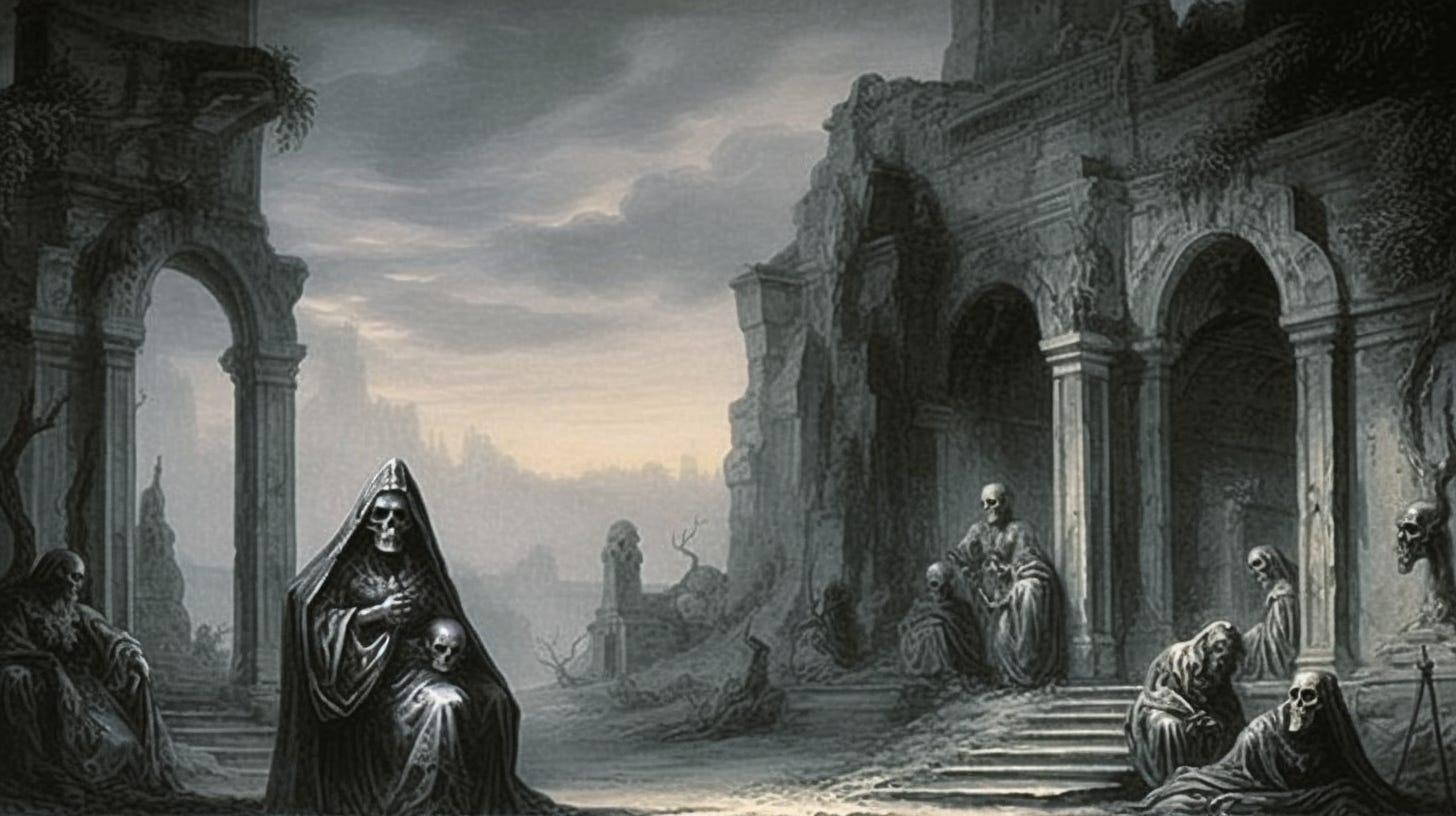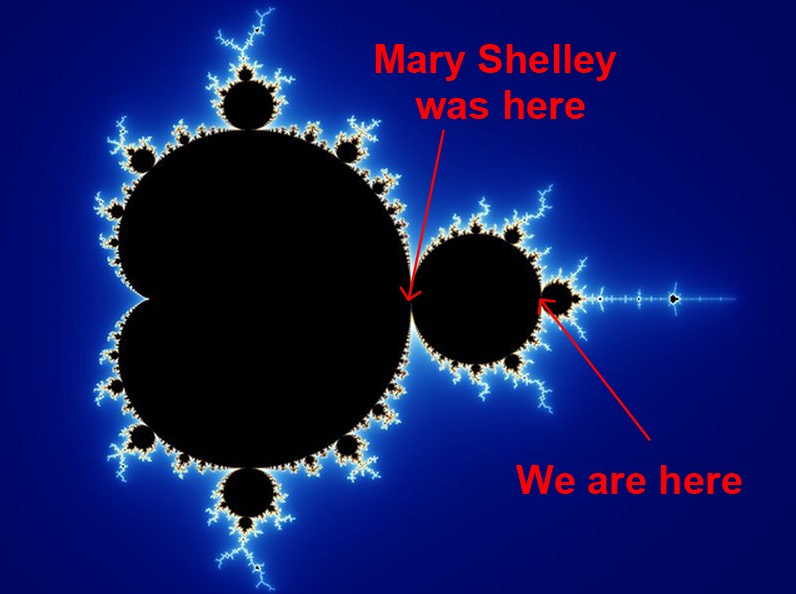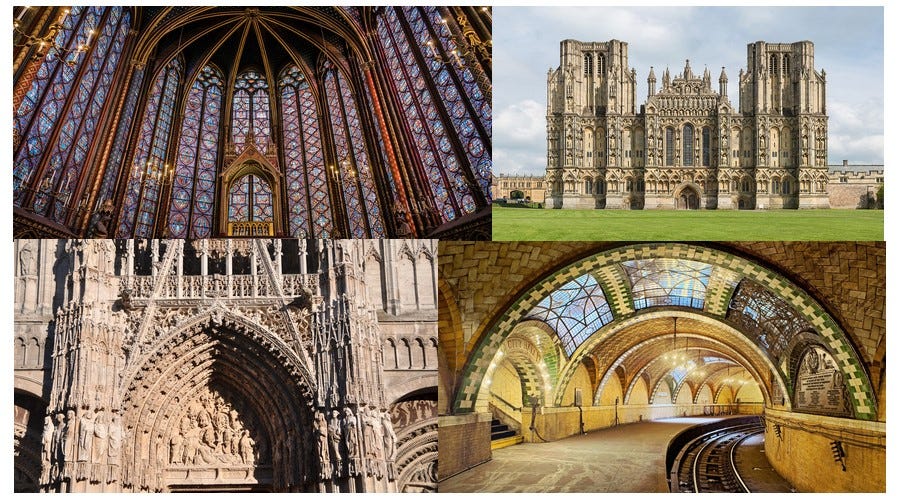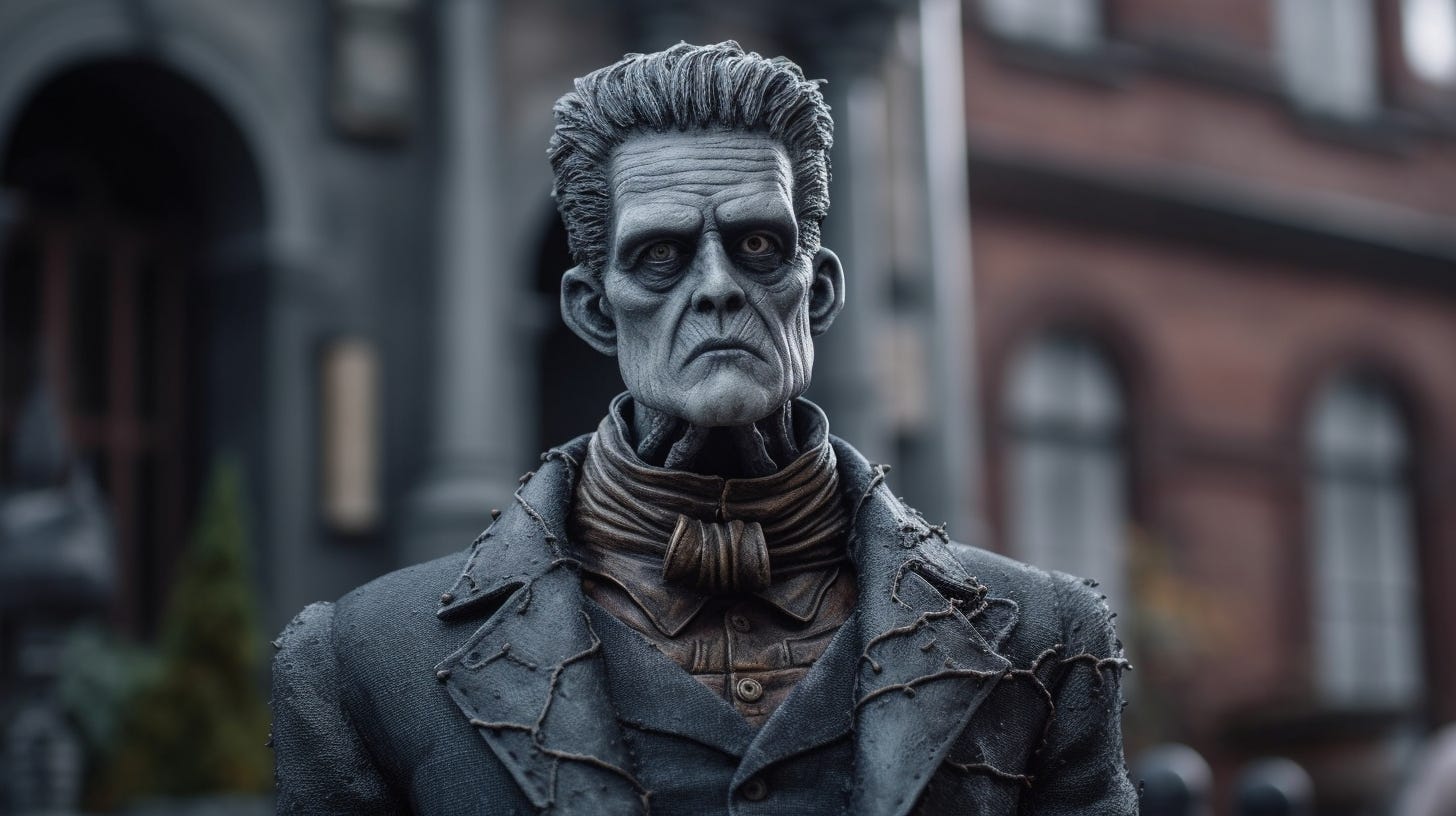Other RTE articles about the Nazi Wars can be found here. Some more active conversation about topics such as this can be found at the RTE Locals channel.
From where did this grim, gothic perspective arise? What have we misunderstood?
The Masque of Anarchy by Percey Bysshe Shelley
Percey Bysshe Shelley remains one of my favorite poets. His Ozymandias was the first poem I ever memorized. Bryan Cranston's reading of it is worth taking in.
If TLDR (God forbid!), skip to the next section. You may become curious enough to return. No, seriously, it's fine.
The Masque of Anarchy, written after the Peterloo Massacre of 1819:
As I lay asleep in Italy
There came a voice from over the Sea,
And with great power it forth led me
To walk in the visions of Poesy.
2
I met Murder on the way--
He had a mask like Castlereagh--
Very smooth he looked, yet grim;
Seven blood-hounds followed him:
3
All were fat; and well they might
Be in admirable plight,
For one by one, and two by two,
He tossed them human hearts to chew
4
Which from his wide cloak he drew.
Next came Fraud, and he had on,
Like Eldon, an ermined gown;
His big tears, for he wept well,
Turned to mill-stones as they fell.
5
And the little children, who
Round his feet played to and fro,
Thinking every tear a gem,
Had their brains knocked out by them.
6
Clothed with the Bible, as with light,
And the shadows of the night,
Like Sidmouth, next, Hypocrisy
On a crocodile rode by.
7
And many more Destructions played
In this ghastly masquerade,
All disguised, even to the eyes,
Like Bishops, lawyers, peers, or spies.
8
Last came Anarchy: he rode
On a white horse, splashed with blood;
He was pale even to the lips,
Like Death in the Apocalypse.
9
And he wore a kingly crown;
And in his grasp a sceptre shone;
On his brow this mark I saw--
'I AM GOD, AND KING, AND LAW!'
10
With a pace stately and fast,
Over English land he passed,
Trampling to a mire of blood
The adoring multitude.
11
And a mighty troop around,
With their trampling shook the ground,
Waving each a bloody sword,
For the service of their Lord.
12
And with glorious triumph, they
Rode through England proud and gay,
Drunk as with intoxication
Of the wine of desolation.
13
O'er fields and towns, from sea to sea,
Passed the Pageant swift and free,
Tearing up, and trampling down;
Till they came to London town.
14
And each dweller, panic-stricken,
Felt his heart with terror sicken
Hearing the tempestuous cry
Of the triumph of Anarchy.
15
For with pomp to meet him came,
Clothed in arms like blood and flame,
The hired murderers, who did sing
`Thou art God, and Law, and King.
16
We have waited, weak and lone
For thy coming, Mighty One!
Our purses are empty, our swords are cold,
Give us glory, and blood, and gold.'
17
Lawyers and priests, a motley crowd,
To the earth their pale brows bowed;
Like a bad prayer not over loud,
Whispering -- `Thou art Law and God.' --
18
Then all cried with one accord,
`Thou art King, and God, and Lord;
Anarchy, to thee we bow,
Be thy name made holy now!'
19
And Anarchy, the Skeleton,
Bowed and grinned to every one,
As well as if his education
Had cost ten millions to the nation.
20
For he knew the Palaces
Of our Kings were rightly his;
His the sceptre, crown, and globe,
And the gold-inwoven robe.
21
So he sent his slaves before
To seize upon the Bank and Tower,
And was proceeding with intent
To meet his pensioned Parliament
22
When one fled past, a maniac maid,
And her name was Hope, she said:
But she looked more like Despair,
And she cried out in the air:
23
`My father Time is weak and gray
With waiting for a better day;
See how idiot-like he stands,
Fumbling with his palsied hands!
24
`He has had child after child,
And the dust of death is piled
Over every one but me--
Misery, oh, Misery!'
25
Then she lay down in the street,
Right before the horses' feet,
Expecting, with a patient eye,
Murder, Fraud, and Anarchy.
26
When between her and her foes
A mist, a light, an image rose,
Small at first, and weak, and frail
Like the vapour of a vale:
27
Till as clouds grow on the blast,
Like tower-crowned giants striding fast,
And glare with lightnings as they fly,
And speak in thunder to the sky,
28
It grew -- a Shape arrayed in mail
Brighter than the viper's scale,
And upborne on wings whose grain
Was as the light of sunny rain.
29
On its helm, seen far away,
A planet, like the Morning's, lay;
And those plumes its light rained through
Like a shower of crimson dew.
30
With step as soft as wind it passed
O'er the heads of men -- so fast
That they knew the presence there,
And looked, -- but all was empty air.
31
As flowers beneath May's footstep waken,
As stars from Night's loose hair are shaken,
As waves arise when loud winds call,
Thoughts sprung where'er that step did fall.
32
And the prostrate multitude
Looked -- and ankle-deep in blood,
Hope, that maiden most serene,
Was walking with a quiet mien:
33
And Anarchy, the ghastly birth,
Lay dead earth upon the earth;
The Horse of Death tameless as wind
Fled, and with his hoofs did grind
To dust the murderers thronged behind.
34
A rushing light of clouds and splendour,
A sense awakening and yet tender
Was heard and felt -- and at its close
These words of joy and fear arose
35
As if their own indignant Earth
Which gave the sons of England birth
Had felt their blood upon her brow,
And shuddering with a mother's throe
36
Had turnèd every drop of blood
By which her face had been bedewed
To an accent unwithstood,--
As if her heart had cried aloud:
37
`Men of England, heirs of Glory,
Heroes of unwritten story,
Nurslings of one mighty Mother,
Hopes of her, and one another;
38
`Rise like Lions after slumber
In unvanquishable number,
Shake your chains to earth like dew
Which in sleep had fallen on you --
Ye are many -- they are few.
39
`What is Freedom? -- ye can tell
That which slavery is, too well --
For its very name has grown
To an echo of your own.<
40
`'Tis to work and have such pay
As just keeps life from day to day
In your limbs, as in a cell
For the tyrants' use to dwell,
41
`So that ye for them are made
Loom, and plough, and sword, and spade,
With or without your own will bent
To their defence and nourishment.
42
`'Tis to see your children weak
With their mothers pine and peak,
When the winter winds are bleak,--
They are dying whilst I speak.
43
`'Tis to hunger for such diet
As the rich man in his riot
Casts to the fat dogs that lie
Surfeiting beneath his eye;
44
`'Tis to let the Ghost of Gold
Take from Toil a thousandfold
More than e'er its substance could
In the tyrannies of old.
45
`Paper coin -- that forgery
Of the title-deeds, which ye
Hold to something of the worth
Of the inheritance of Earth.
46
`'Tis to be a slave in soul
And to hold no strong control
Over your own wills, but be
All that others make of ye.
47
`And at length when ye complain
With a murmur weak and vain
'Tis to see the Tyrant's crew
Ride over your wives and you--
Blood is on the grass like dew.
48
`Then it is to feel revenge
Fiercely thirsting to exchange
Blood for blood -- and wrong for wrong --
Do not thus when ye are strong.
49
`Birds find rest, in narrow nest
When weary of their wingèd quest;
Beasts find fare, in woody lair
When storm and snow are in the air,
50
`Asses, swine, have litter spread
And with fitting food are fed;
All things have a home but one--
Thou, Oh, Englishman, hast none!
51
`This is Slavery -- savage men,
Or wild beasts within a den
Would endure not as ye do--
But such ills they never knew.
52
`What art thou Freedom? O! could slaves
Answer from their living graves
This demand -- tyrants would flee
Like a dream's dim imagery:
53
`Thou art not, as impostors say,
A shadow soon to pass away,
A superstition, and a name
Echoing from the cave of Fame.
54
`For the labourer thou art bread,
And a comely table spread
From his daily labour come
In a neat and happy home.
55
`Thou art clothes, and fire, and food
For the trampled multitude--
No -- in countries that are free
Such starvation cannot be
As in England now we see.
56
`To the rich thou art a check,
When his foot is on the neck
Of his victim, thou dost make
That he treads upon a snake.
57
`Thou art Justice -- ne'er for gold
May thy righteous laws be sold
As laws are in England -- thou
Shield'st alike the high and low.
58
`Thou art Wisdom -- Freemen never
Dream that God will damn for ever
All who think those things untrue
Of which Priests make such ado.
59
`Thou art Peace -- never by thee
Would blood and treasure wasted be
As tyrants wasted them, when all
Leagued to quench thy flame in Gaul.
60
`What if English toil and blood
Was poured forth, even as a flood?
It availed, Oh, Liberty,
To dim, but not extinguish thee.
61
`Thou art Love -- the rich have kissed
Thy feet, and like him following Christ,
Give their substance to the free
And through the rough world follow thee,
62
`Or turn their wealth to arms, and make
War for thy belovèd sake
On wealth, and war, and fraud--whence they
Drew the power which is their prey.
63
`Science, Poetry, and Thought
Are thy lamps; they make the lot
Of the dwellers in a cot
So serene, they curse it not.
64
`Spirit, Patience, Gentleness,
All that can adorn and bless
Art thou -- let deeds, not words, express
Thine exceeding loveliness.
65
`Let a great Assembly be
Of the fearless and the free
On some spot of English ground
Where the plains stretch wide around.
66
`Let the blue sky overhead,
The green earth on which ye tread,
All that must eternal be
Witness the solemnity.
67
`From the corners uttermost
Of the bonds of English coast;
From every hut, village, and town
Where those who live and suffer moan
For others' misery or their own.2
68
`From the workhouse and the prison
Where pale as corpses newly risen,
Women, children, young and old
Groan for pain, and weep for cold--
69
`From the haunts of daily life
Where is waged the daily strife
With common wants and common cares
Which sows the human heart with tares--
70
`Lastly from the palaces
Where the murmur of distress
Echoes, like the distant sound
Of a wind alive around
71
`Those prison halls of wealth and fashion,
Where some few feel such compassion
For those who groan, and toil, and wail
As must make their brethren pale--
72
`Ye who suffer woes untold,
Or to feel, or to behold
Your lost country bought and sold
With a price of blood and gold--
73
`Let a vast assembly be,
And with great solemnity
Declare with measured words that ye
Are, as God has made ye, free--
74
`Be your strong and simple words
Keen to wound as sharpened swords,
And wide as targes let them be,
With their shade to cover ye.
75
`Let the tyrants pour around
With a quick and startling sound,
Like the loosening of a sea,
Troops of armed emblazonry.
76
`Let the charged artillery drive
Till the dead air seems alive
With the clash of clanging wheels,
And the tramp of horses' heels.
77
`Let the fixèd bayonet
Gleam with sharp desire to wet
Its bright point in English blood
Looking keen as one for food.
78
`Let the horsemen's scimitars
Wheel and flash, like sphereless stars
Thirsting to eclipse their burning
In a sea of death and mourning.
79
`Stand ye calm and resolute,
Like a forest close and mute,
With folded arms and looks which are
Weapons of unvanquished war,
80
`And let Panic, who outspeeds
The career of armèd steeds
Pass, a disregarded shade
Through your phalanx undismayed.
81
`Let the laws of your own land,
Good or ill, between ye stand
Hand to hand, and foot to foot,
Arbiters of the dispute,
82
`The old laws of England -- they
Whose reverend heads with age are gray,
Children of a wiser day;
And whose solemn voice must be
Thine own echo -- Liberty!
83
`On those who first should violate
Such sacred heralds in their state
Rest the blood that must ensue,
And it will not rest on you.
84
`And if then the tyrants dare
Let them ride among you there,
Slash, and stab, and maim, and hew,--
What they like, that let them do.
85
`With folded arms and steady eyes,
And little fear, and less surprise,
Look upon them as they slay
Till their rage has died away.
86
`Then they will return with shame
To the place from which they came,
And the blood thus shed will speak
In hot blushes on their cheek.
87
`Every woman in the land
Will point at them as they stand--
They will hardly dare to greet
Their acquaintance in the street.
88
`And the bold, true warriors
Who have hugged Danger in wars
Will turn to those who would be free,
Ashamed of such base company.
89
`And that slaughter to the Nation
Shall steam up like inspiration,
Eloquent, oracular;
A volcano heard afar.
90
`And these words shall then become
Like Oppression's thundered doom
Ringing through each heart and brain,
Heard again -- again -- again--
91
`Rise like Lions after slumber
In unvanquishable number--
Shake your chains to earth like dew
Which in sleep had fallen on you--
Ye are many -- they are few.'
Liberty and Frankenstein
Percy Shelley's above poem/ballad stands out as a momentous statement of nonviolent resistance in the struggle for liberty. It influenced many subsequent statements, poems, and movements of nonviolence on multiple continents since—at least many of those with the clout to stand out in the history books.
Not to be overly critical, but two thousand or so words can weave a tapestry, but every tapestry is but an image, with dimensions sliced away. We are always left reaching for the bigger picture. What is the human condition? Is there more to the story we do not or cannot know?
Coincidentally, Percy's second wife, Mary Shelley—who adored Percy as a genius from whom she learned what she had missed during an exceptional intellectual upbringing—may have authored the greatest possible extension of Percy's explorations! During that famous stay with Lord Byron during which Mary Shelley wrote Frankenstein; or, The Modern Prometheus.
Skipping past the well-known story of Byron's challenge to his small, brilliant literary crew that might have diffused and directed a great deal of creative, gothic sexual angst, let us focus on the door's opened by Frankenstein, generally considered the inception of the science fiction genre. The post-French Revolution world was struggling in intellectual eddies trying to sort out the challenges posed by modern science.
Science has always evolved hand-in-hand with pseudoscience and alchemy. Here I might describe pseudoscience as entirely misguided by incompetence, while alchemy, undertaken even by the brilliant Sir Isaac Newton, might be described as, "we didn't know there was no scientific result here until we tried and tried and tried." Newton was, after all, a conspiracy theorist (gasp) and Unitarian nearly kept out of Cambridge for refusing to sign the statement of the Trinity. His research into what he considered a historically corrupted Catholic church and its relationship with the gold banking cartel guided him in a failed attempt to become Satoshi Nakamoto a few hundred years too early.
In truth, the distinctions between science (the modern driver of technology and wealth) and pseudoscience or alchemy are already blurry enough that they are often defined best with years, decades, or centuries of hindsight. It might even be the case that the critics of Scientism and technocracy are sometimes guilty of failing to tease out the delicate distinctions that allow for us to recognize what goes wrong between culture and ideation. In a single night of inspiration that drew on Mary's unique twenty years and change of life, she crafted the first verbal image of that fractal from the perspective of its bleeding edge, from which the further unfolding of history has validated her warnings.
And here lies the misunderstanding of the gothic literature from which science fiction sprang. Science fiction still contains the macabre at its core, but also the seeds of technology—for better and for worse. It's about the complexity recognized by the increasingly educated minds that infused the Modern world with ideas simultaneously both liberating and dangerous. This is why the pre-science fiction genre took its name from the gothic architecture of the day that produced dazzling results from patterns of self-similarity owed to conceptions of the infinite only recently reached by the deepest mathematicians (such as Newton) of the era.
The sculptures of dwelling contain features simultaneously beautiful, majestic, and isolating. The modern world both propels us forward materialistically, and leaves us behind spiritually. And literary exploration of this conundrum came together in the Shelley family.
What the Shelleys did was to connect the emergent Science-Scientism dichotomy with what they experienced on a human level. Percy Shelley was the aristocratic Renaissance man who spent time studying science at Oxford, including the nascent physics of electromagnetism. Percy discussed with Lord Byron the recent but serious musings of Luigi Galvani regarding the conception of "animal electricity" (or "Galvanism") as a vital force that gave organic life the energy feedback loops that distinguished it from ordinary matter. Such thought experiments have developed for more than two centuries into today's genetics and biological sciences research.
These discussions relate directly to the romance between Percy and Mary, whose relationship began when he was 20 and she was 16. But she was a precocious teenager who had begun publishing poetry at the age of eleven, both tutored and self-taught in a broad array of artistic and linguistic endeavors. Lacking a mother who died of sepsis shortly after her birth, and with an emotionally lacking relationship with her father (something her stepmother tried, but was unable to fill), Mary's studies in the humanities lacked the tenderness of humanity. Mary's love for Percy might be viewed as a combination of finding an intellectual equal as a companion, and experiencing a deeply-needed emotional bond with him. Their romance blossomed out of readings of Mary's mother's own literary work at her grave site.
While commentators have sometimes suggested that Mary wrote Frankenstein inspired by Percy's [superficial] academic studies, she was also escaping her own life as a freak—a child (and a girl, gasp) who ran intellectual circles around adults, but found herself abandoned first by her parents, then by most of society. What Mary Shelley discovered in a flash of brilliance, and what the readers of the public surely recognized in some form, was the potential monster found in herself, in her husband, and in much of the educated Western Mandarin class.
The fictional Dr. Viktor Frankenstein was Swiss, but perhaps most stereotypical of the educated Prussian. Though Frankenstein's monster was not a man, he might be best viewed as a warning about the typical well-educated, emotionally starved, Nazi Man.









Dear Mathew,
I inform you that the youtube video you have embedded in the post is blocked in my country (Spain.) Youtube says it has been blocked by the user who uploaded (is that true?)
Solution: I have searched the id (T3dpghfRBHE) of the youtube video on Odysee, and I have found this video https://odysee.com/@ChaosControl_VA:6/''ozymandias''-(sonic-06-edit):e
whose title is "''Ozymandias'' (Sonic 06 Edit)" and I ask confirmation whether it is the same video.
This was possible because, for some reason, the people who mirror their youtube channels in Odysee include the url with the id of the original video, and sometimes even the date of upload, in the video description, and the always improving search function of odysee has been able to match the id with the text in the description.
I don't know how this geo-blocking is still a thing in 2023. I could write a dozen expletives here, but I will save those for a better occasion.
Off-topic question:
Do you know something about the future of Odysee? I listened in the podcast of Thad Russell that Jeremy Kauffman said that they (Odysee) were going bankrupt. The Federal Government is using some underhanded tactic relative to the definition of securities or another financial instrument to censor the free speech in Odysee, using the argument that LBRY does not remove videos and they are linked to blockchain transactions, and it doesn't matter that Odysee removes the access to the videos because they still exist in the network of LBRY. I have probably misunderstood the situation. I think it would be very worrying that they are attacking Odysee in that way.
Mathew, do you know something about this?
Thanks, Mathew. Although a poetry major (that sounds funny to me now) more than 50 years ago, I was unfamiliar with The Masque of Anarchy, a truly impressive piece. What is worrisome to me in our technocratic present and future is its soullessness. Gone, it seems among many today, is curiosity and wonderment. This state of reality didn't begin with the Progressive Era in the late 19th Century, but it sure got on its horse and spurred it to a gallop.